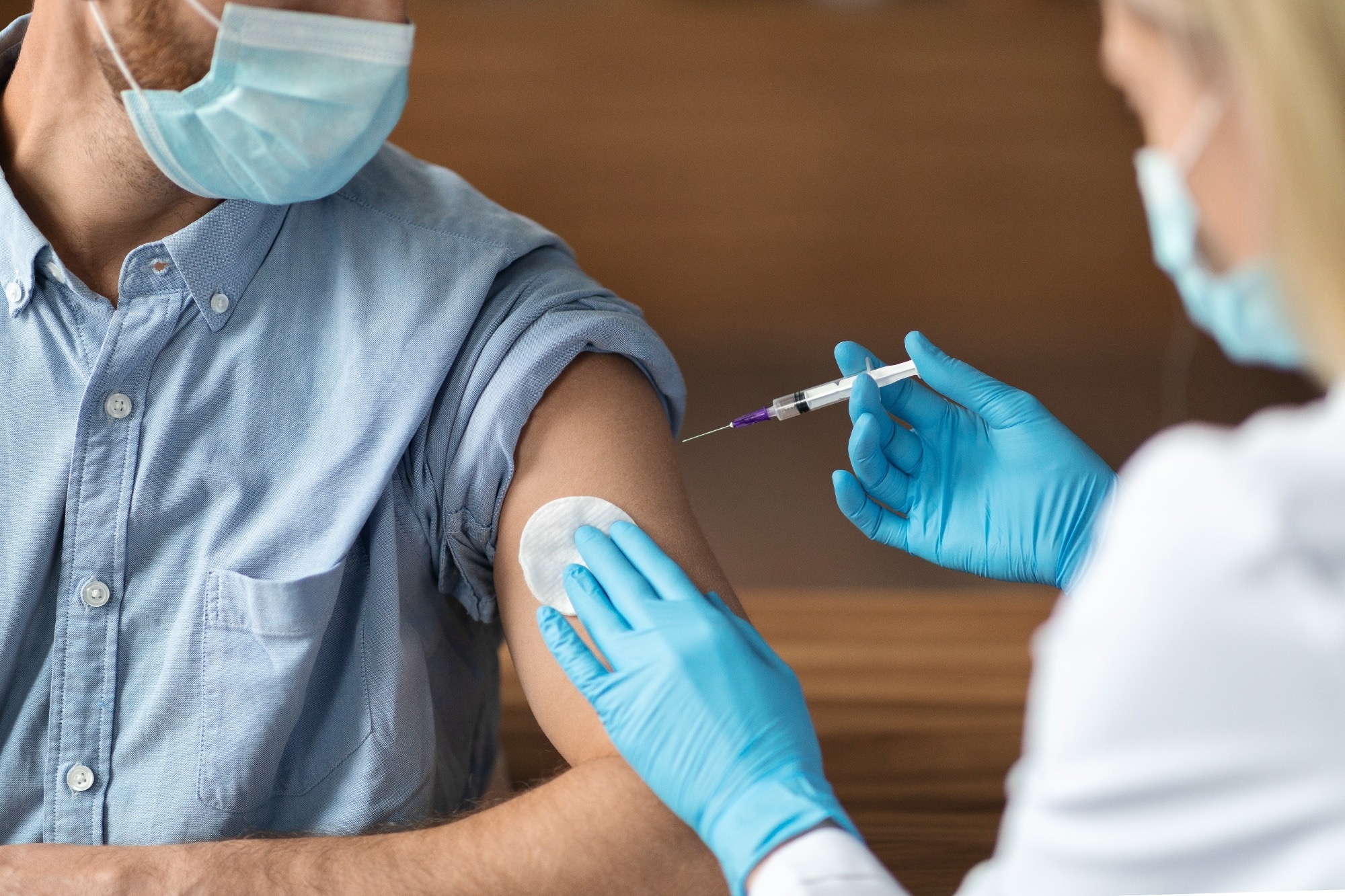Coronavirus disease 2019 (COVID-19) vaccinations have played a crucial role in reducing severe infection, morbidity, and mortality during the pandemic.
However, certain patient groups still face a higher risk of death due to COVID-19, even after receiving the primary vaccination course. Furthermore, the effectiveness of vaccines may decline over time.
To address these concerns and overcome severe outcomes, booster doses were introduced, as other infection control measures were relaxed.
In a recent study posted to the medRxiv* preprint server, researchers identify patient groups at a higher risk of death due to COVID-19 among adults who received a second booster dose in England.
 Study: Risk of COVID-19 death in adults who received booster COVID-19 vaccinations: national retrospective cohort study on 14.6 million people in England. Image Credit: Shutterstock.com
Study: Risk of COVID-19 death in adults who received booster COVID-19 vaccinations: national retrospective cohort study on 14.6 million people in England. Image Credit: Shutterstock.com

 *Important notice: medRxiv publishes preliminary scientific reports that are not peer-reviewed and, therefore, should not be regarded as conclusive, guide clinical practice/health-related behavior, or treated as established information.
*Important notice: medRxiv publishes preliminary scientific reports that are not peer-reviewed and, therefore, should not be regarded as conclusive, guide clinical practice/health-related behavior, or treated as established information.
About the study
The researchers utilized person-level data from the 2021 Census linked to various health records to investigate the association between COVID-19 booster doses and mortality outcomes in England. The linked dataset included information on 52 million individuals, which accounted for 91.8% of the population.
The study population consisted of individuals between 50-100 years of age who received a COVID-19 booster dose after September 1, 2022. Booster doses were administered at least 84 days after their most recent clinically acceptable dose, with all patients having received at least two vaccine doses before the booster.
The primary outcome was COVID-19 death, which was identified by specific International Classification of Disease (ICD) codes on death certificates. The secondary outcome was non-COVID-19 mortality. Individuals were monitored from 14 days after the booster dose until April 11, 2023, the occurrence of death, or end of the study period.
Medical conditions were identified using primary care records from definitions utilized by the QCovid2 risk prediction model. These data were collected between March 1, 2015, and March 21, 2021. Missing census characteristics were determined by nearest-neighbor donor imputation, which is the methodology employed by the Office for National Statistics (ONS) for 2011 Census variables. Missing body mass index (BMI) data was managed by adding a “Missing” category.
Cause-specific Cox regression analysis was conducted to determine the association between each health comorbidity and the danger of COVID-19 death, as well as all-other-cause mortality. A model adjusted for age, sex, and calendar time was used, with additional adjustments made for ethnic group, region, BMI, and disability.
Advanced age and health conditions increase risk of COVID-19 death among boosted individuals
The study included 14,651,440 individuals between 50-100 years of age, with a mean age of 67.9 years. Among the study population, 90.4% were White British individuals, and 46.9% were male.
Between September 1, 2022, to April 11, 2023, 150,075 non-COVID-19 deaths and 6,800 COVID-19 deaths were reported. The mean age was 84 years for COVID-19 deaths and 82.3 years for non-COVID-19 deaths.
Age was a significant predictor, with a higher risk associated with increasing age. Women had a lower risk of death as compared to men.
Black Caribbean, Indian, and other ethnic groups had a lower risk of COVID-19 death as compared to the White British group. Being morbidly obese or underweight increases the risk of COVID-19 and non-COVID-19 death.
Several health conditions were associated with a higher risk of COVID-19-related death, including learning disabilities or Down’s syndrome, pulmonary hypertension or fibrosis, motor neuron disease, multiple sclerosis, cancer of bone marrow and blood, myasthenia or Huntington’s disease, Parkinson’s disease, lung or oral cancer, dementia, and liver cirrhosis.
Specific conditions such as cancers of the blood or bone marrow, chronic kidney diseases, cystic fibrosis, pulmonary hypotension or fibrosis, systemic lupus erythematosus, and rheumatoid arthritis were also associated with a higher relative risk of COVID-19 death as compared to non-COVID-19 death.
In a supplementary analysis not adjusted for other health conditions, the danger of COVID-19 outcomes was higher than that in a model where other conditions were considered. Notably, the risk was lower for asthma in the model adjusted for other health conditions; however, in the supplementary analysis, the risk of death was significantly higher for individuals diagnosed with asthma.
Conclusions
To effectively manage COVID-19 risk, it is crucial to prioritize the most vulnerable groups for booster vaccination. According to the authors, this study was the first to investigate the risk of COVID-19 and non-COVID-19 deaths in adults who received a booster dose in the autumn of 2022.
Certain patient groups had a particularly higher risk of COVID-19 death as compared to death from other causes. Thus, these groups should be prioritized for subsequent vaccinations, therapeutics, and innovative treatments.
Additionally, the researchers highlight the risk associated with various health conditions and sociodemographic characteristics. Taken together, this information can inform policymakers and other researchers regarding key demographics of interest for future research and vaccination efforts.

 *Important notice: medRxiv publishes preliminary scientific reports that are not peer-reviewed and, therefore, should not be regarded as conclusive, guide clinical practice/health-related behavior, or treated as established information.
*Important notice: medRxiv publishes preliminary scientific reports that are not peer-reviewed and, therefore, should not be regarded as conclusive, guide clinical practice/health-related behavior, or treated as established information.